| HOME |
OLD ACA |
|
MUSICIANS | ZECA FILES | REVIEWS | RIO ART ROCK | BLOG | DOWNLOADS | BANNERS | STOLEN | CONTACT | MEMORABILIA | PORTUGUÊS | ||
 |
 |
 |
 |
 |
 |
 |
 |
 |
 |
 |
 |
 |
 |

Compilation: Guerra Civil (1981) + Fim do Mundo (1983) + Piolho (1985)
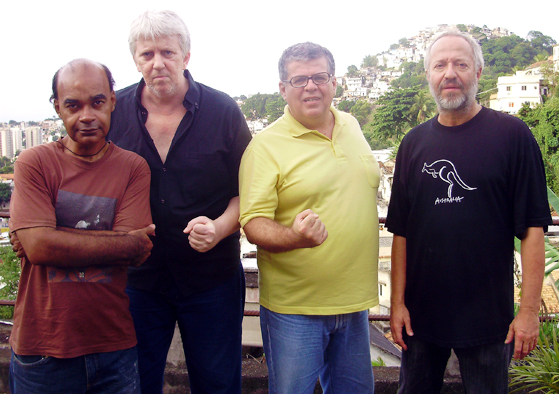
Acidente 2011: Zeca Pereira, Scubi Jenné, Guto Rolim and Paulo Malária
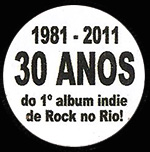 There was a time when
things seemed they were going to happen. This
applies to almost everything, in this case the
subject is Brazilian garage rock. Acidente, "that
band that nobody knows but everyone have heard
of", was founded in 1978 in Rio by journalism
students and came some prominence in the
underground musical scene of Rio de Janeiro, but
later, as they launched their independent albums,
has been meticulously disinvented by the media,
along with many other bands in the same situation,
so that half a dozen or twenty minions could
occupy exclusively all available space and
therefore, without competitors, enjoy all the fame
and fortune that brief affair between the
Brazilian audience and rock had to offer.
There was a time when
things seemed they were going to happen. This
applies to almost everything, in this case the
subject is Brazilian garage rock. Acidente, "that
band that nobody knows but everyone have heard
of", was founded in 1978 in Rio by journalism
students and came some prominence in the
underground musical scene of Rio de Janeiro, but
later, as they launched their independent albums,
has been meticulously disinvented by the media,
along with many other bands in the same situation,
so that half a dozen or twenty minions could
occupy exclusively all available space and
therefore, without competitors, enjoy all the fame
and fortune that brief affair between the
Brazilian audience and rock had to offer.There were two bands with the same name Acidente, both different in time and style, with nothing in common except the name and the producer / keyboardist. The second Acidente, created in 1989, had a proposal of being primarily instrumental, with progressive influences, and its work is well documented on CD, such as the fusion that followed from 2003, with old and new members keeping alive the flame through sporadic releases. However, the original Acidente, the first and only "Old ACA", remained restricted to old vinyls - until now, when it's celebrated 30 years of the group's first LP, "Guerra Civil".
Two garage bands ("groups" as it was called then) gave rise to Acidente. In "One Night Stand Band", formed in 1974, played Guto Rolim, Zeca Pereira and Paulo Malária, doing a mixture of basic rock, ballads and difficult themes to label. Meanwhile, Helio "Scubi" Jenné and Raul Branco were making their seventies rock operas (which were never made public) under the name Leviathan. The meeting of Scubi with Raul and Mala in the Communication School at UFRJ, in 1977, arose the ephemeral The Merry Compadres of Windsor and in the following year, Acidente finally debuted in a troubled university festival in noble grounds, where there were all the ingredients: cries, turmoil, insults, vomiting. The Acidente was officially launched, with its proposal, which has changed substantially over the years, just like its members.
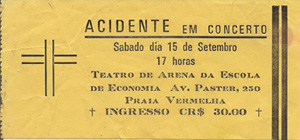 The times that followed were
of intense creativity and Aça became an easy
presence in university hostels and night
rookeries, where his concerts attracted a small
crowd of rockers eager for something different and
authentic, to raise their spirits into
hallucinating trips and abstracted them for some
hours of the fact that they live a miserable Third
World dictatorship. Acidente used to make the mind
of his musicians and also of his fans.
The times that followed were
of intense creativity and Aça became an easy
presence in university hostels and night
rookeries, where his concerts attracted a small
crowd of rockers eager for something different and
authentic, to raise their spirits into
hallucinating trips and abstracted them for some
hours of the fact that they live a miserable Third
World dictatorship. Acidente used to make the mind
of his musicians and also of his fans.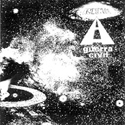 Everything
was going well and a record seemed to be a natural
consequence, however as no label was interested
(for several years, the national catalog of rock
came down to three or four well known names), the
band's keyboardist pissed off and decided to
produce. The result of inexperience was the first
LP of an independent rock band from Rio de
Janeiro: "Guerra Civil",
which came out in June 1981. In the photo below,
the lineup of the time: Mala (keyboards, vocals),
Guto (Bass), Scubi (guitar, vocals), Zeca (drums)
and guitarist Fernando Sá (Samuca), who left the
band shortly after to start his own group. Because
then the public's demand for Brazilian rock was
becoming unstoppable for the meager investments
that were made by major labels of the music
industry, and new bands began to appear by the
dozens every day.
Everything
was going well and a record seemed to be a natural
consequence, however as no label was interested
(for several years, the national catalog of rock
came down to three or four well known names), the
band's keyboardist pissed off and decided to
produce. The result of inexperience was the first
LP of an independent rock band from Rio de
Janeiro: "Guerra Civil",
which came out in June 1981. In the photo below,
the lineup of the time: Mala (keyboards, vocals),
Guto (Bass), Scubi (guitar, vocals), Zeca (drums)
and guitarist Fernando Sá (Samuca), who left the
band shortly after to start his own group. Because
then the public's demand for Brazilian rock was
becoming unstoppable for the meager investments
that were made by major labels of the music
industry, and new bands began to appear by the
dozens every day.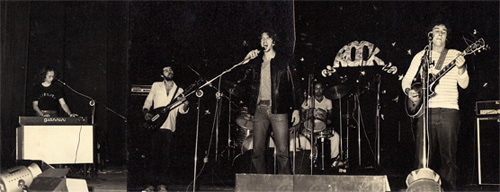
Acidente plays at Lemos
Cunha Theatre - 1981
With their album in hands, the members of Acidente invested with the extra function of publishers discovered the truth: the doors of media, both printed and electronic, were closed to the independents. Almost every second or millimeter was priceless, and all were already allotted (we wouldn't pay anyway ...). "Guerra Civil" faced an almost complete ignorance in the public square was burned in protest, until a program ("Poeira e Country") of large audience by a Rio radio (98 FM) became fascinated by the band song "The Cowboy and the Debutant" and began to play it every day, including placing it several times in the 1st place. This was the summer of 1981 to 1982.
Immediatly thereafter, arose online in its experimental phase, Fluminense FM, "A Maldita" and played the album in its radio programming several tracks incessantly. By the time of Carnival "a Maldita" (the Damned) was the great novelty among the young rockers of Rio and Acidente had its chance of gold.
Like something had to have gone terribly wrong (or you wouldn't now be reading the liner notes of a modest independent album), at that very moment, while hundreds of neophytes popped up, ACA was disbanded and so it was for months. To paraphrase a candidate for governor at that time, the horse has passed saddled only once and Acidente did not rode it.
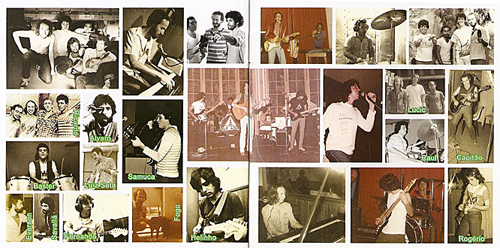
Acidente photo
collage
In this new Land of Rock, Acidente was restructured and returned to stages with a modified line up but to find a time even harder for independents. The Brazilian pop-rock had become a very profitable business for some few feudal lords. When in mid-1983 the band re-entered the studio to record its 2nd vinyl, "Fim do Mundo" (End of the World) (which would be called "Armed Struggle") and ended up inadvertently as eponym of another group), the lineup was already the usual basic Mala, Zeca, Guto, Scubi. The effect was as expected: a stone thrown into a dry lake.
Now, even those who gave rise to indie had already entered the big dance. Do what? Life goes on. The CD (at the time, a single with four songs) "Piolho", of 1985, confirmed that Acidente had really been a great idea - but for others to get along. A few more musicians passed through the band, which in a climate of growing discouragement still made some gigs here and there, until that in 1987 the hammer was hit: the time of the Acidente - that Acidente - "had run its course".
At that point, the "Brazilian Rock" was already a landscape dramatically different from the one that motivated young musicians to form their bands, and no one could imagine that one day the rescue of those insolent recordings would awaken interest, as is evidenced by the fact you are with this CD in hands.
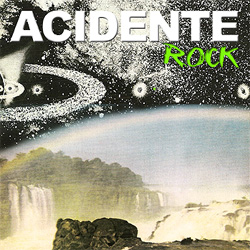
Pg 2 and 3
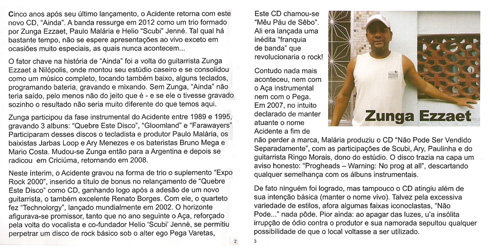
Pg 4 and 5
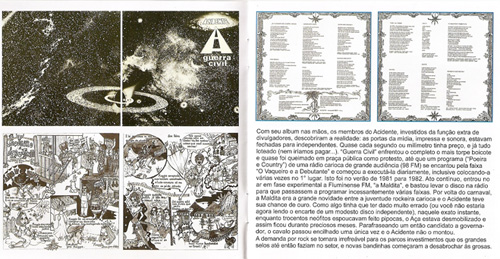
Pg 6 and 7
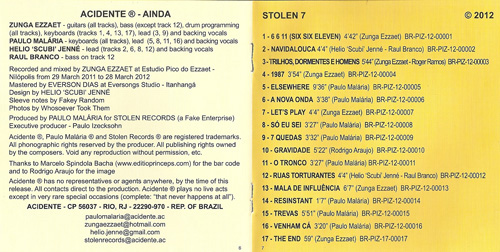
Pg 8 and 9
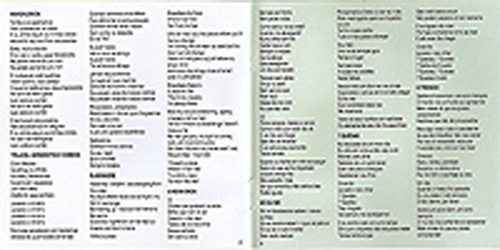
Pg 10 and 11
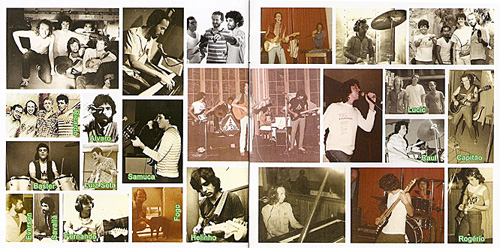
Pg 12 and 13
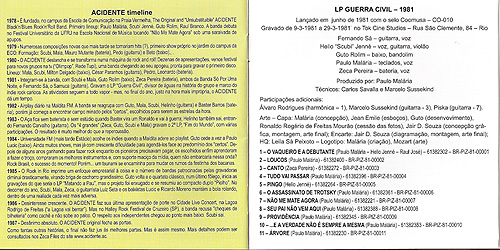
Pg 14 and 15
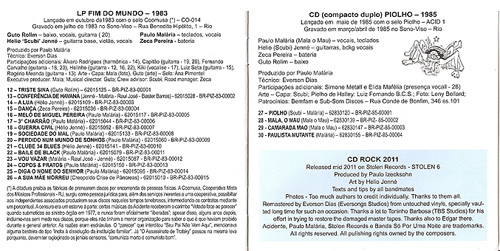
Pg 16
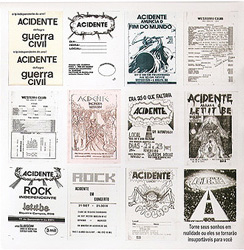
CLICK HERE
to download the zipped leaflet
PLAYLIST OF ROCK
To hear, click on the song name (a new window will open)
To download, click on the arrow at the right.
|
|
|||||||||||
|
|
|||||||||||
| SEARCH THE INTERNET |
|||||||||||
|
|||||||||||